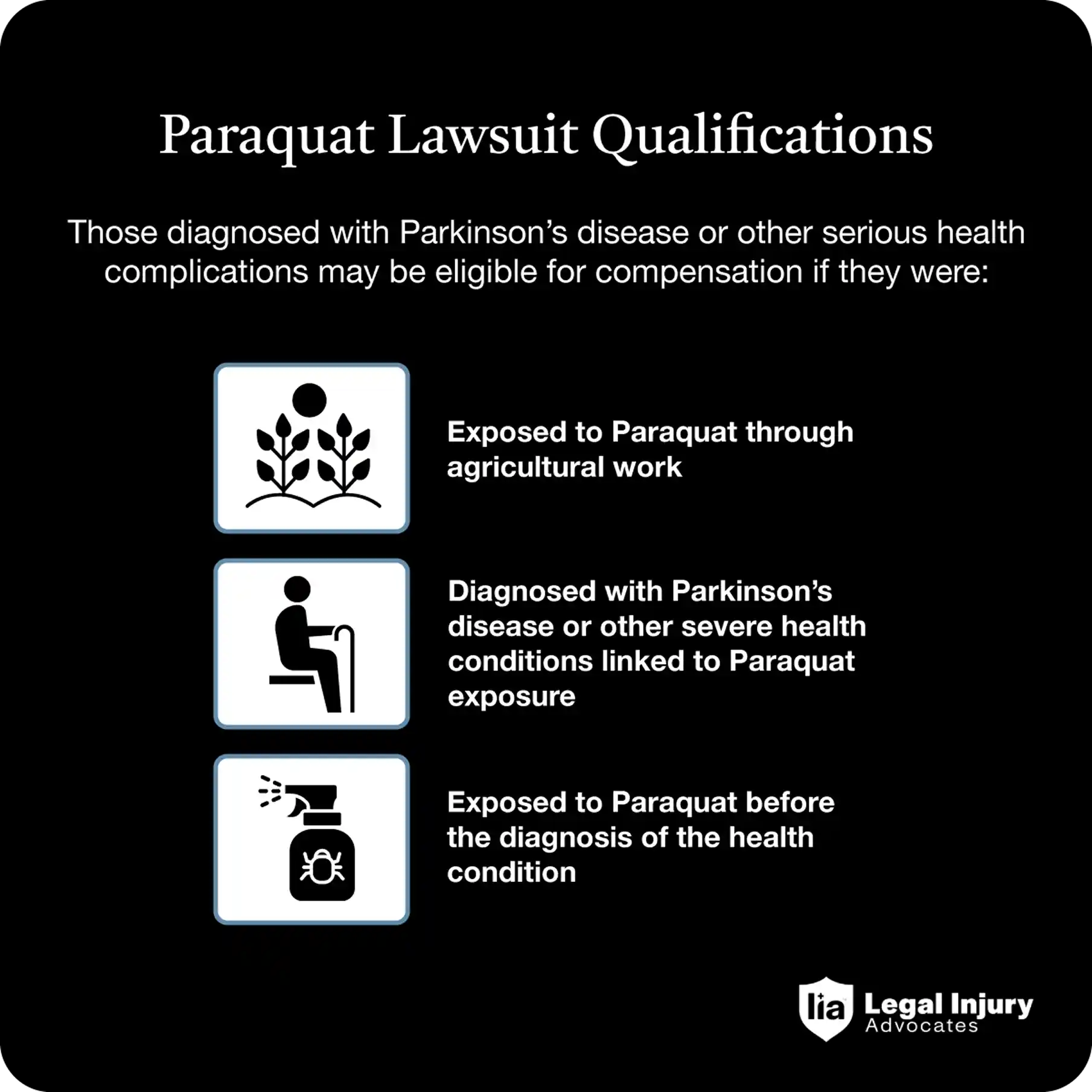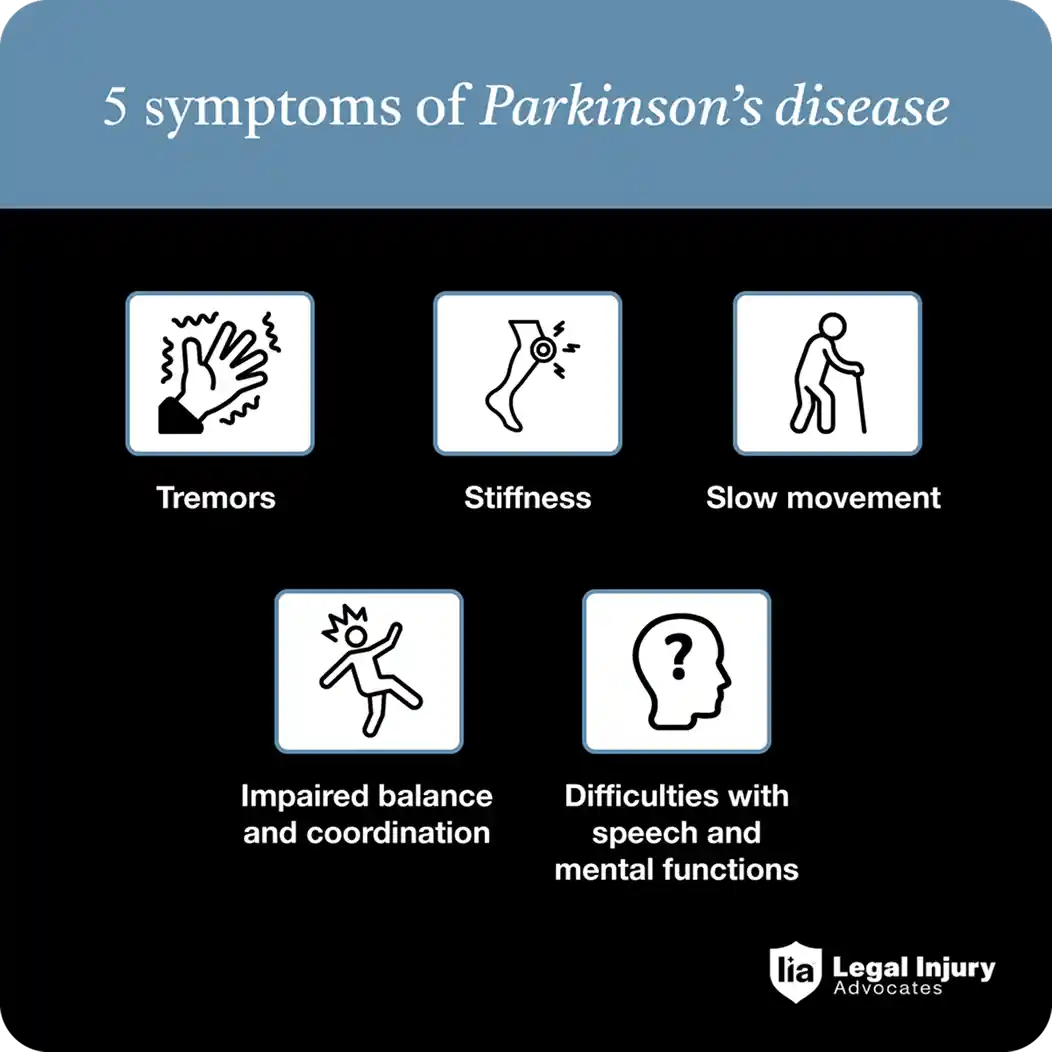Seek justice for you or your loved ones
Who may qualify for a Paraquat lawsuit?

You may be eligible to file a Paraquat lawsuit if you came into contact with the chemical and then developed Parkinson’s disease.
You may have used Paraquat yourself, or you may have worked at a company where it was used. You may have been exposed to Paraquat if you live near a farm where the chemical was used. If you later got diagnosed with Parkinson's disease, you very well may have a case.

How to start your Paraquat claim:
-
1
Fill out the form or call us at (855) LIA-5555.
Start by completing our online form or giving us a call to share basic details about your Paraquat exposure and Parkinson’s diagnosis. -
2
Share your story with our team.
Our team will listen to your story, answer questions and assess whether your Paraquat claim may qualify for legal action. -
3
Let our legal team review your claim.
Our experienced Paraquat legal team will review your claim and discuss next steps. -
4
Prepare for your claim.
You may need to submit medical records or important documents to help us understand the extent of harm caused by your exposure to Paraquat. We’ll help you through this process. -
5
Start your journey to justice.
If your Paraquat claim qualifies, our legal team will guide you through the legal process to seek compensation and accountability.
Check If You Qualify
Submit your claim here:

Health risks allegedly linked to Paraquat plant killer
Paraquat is the brand name for paraquat dichloride, a highly toxic chemical used to kill weeds and grasses.
Even small amounts of Paraquat exposure have been linked to severe health conditions, including Parkinson’s disease.
The chemical is believed to cause damage to neurons that produce dopamine in the brain, a hallmark of Parkinson’s disease. As neurons die and the disease progresses, you may experience tremors, cramps, slowed movement and instability when walking or standing, among other symptoms. You may also suffer anxiety, depression, sleeping problems and changes in your personality and how you think.
What makes Paraquat toxic?
The active ingredient in Paraquat is a molecule called gramoxone. It is so toxic that even a tiny amount may lead to serious health problems or even death.
Gramoxone is particularly dangerous because of the ways you can be exposed to it. You can breathe it in, absorb it through your skin or eat it when you consume food sprayed with it.
While the immediate symptoms of Paraquat poisoning are obvious and severe, the symptoms of Parkinson’s disease can take years to develop.
What happens when you’re exposed to Paraquat?
If you are exposed to Paraquat, you may have trouble breathing, have abdominal pain, vomiting, diarrhea and suffer pain and swelling in your mouth and throat. If the chemical touches your skin, you may also suffer burns.
Chronic conditions may develop some time after exposure. Long-term exposure increases your risk.
Studies suggest a strong link between Paraquat exposure and the development of Parkinson’s disease. Parkinson’s affects your central nervous system and worsens over time. While the disease is a different experience for everyone, common symptoms include:
- tremors
- stiffness
- slow movement
- impaired balance and coordination
- difficulties with speech and mental functions
Companies involved in the Paraquat lawsuits

Lawsuits seek to hold companies accountable for allegedly failing to warn users about Paraquat’s health risks. Companies responsible for making, distributing and selling Paraquat include:
- Syngenta: This company manufactures products containing Paraquat and continues to do so despite its alleged health risks. They marketed Paraquat as safe to use with proper handling and did not warn users of its link to Parkinson’s disease.
- FMC Corp: This chemical company manufactures herbicides containing Paraquat, but has not warned users about the product’s alleged link to Parkinson’s disease.
- Chevron USA, Inc.: This company licensed Paraquat from Syngenta and marketed and distributed it in the U.S. without proper health warnings about the alleged link to Parkinson’s disease.
- Growmark, Inc.: This regional agricultural cooperative sold and supplied Paraquat to farmers and farm workers.
You may be owed financial compensation for medical expenses, lost wages and the suffering caused by Parkinson’s disease. When you file a lawsuit, you raise public awareness of Paraquat’s dangers. You also hold companies responsible for the harm they cause. Your effort aids the push for stricter regulations on using harmful chemicals like Paraquat.

Important Paraquat lawsuit updates
It’s important to stay up-to-date on developments in lawsuits related to Paraquat and their impact on your situation.
- About 7,000 lawsuits are pending with the Southern District of Illinois MDL, a number which is constantly changing due to new cases being filed.
- It is estimated that around $187 million in settlements have been made so far.
- The first study linking Paraquat to Parkinson’s disease was published in Neurology in 1998.
- The first lawsuit for Parkinson's disease product liability was filed in 2017.
- Many of the pending lawsuits were gathered into a single MDL in June 2021.
-
January 2025: Bellwether trial dates set
-
August 2023: Bellwether cases selected
-
June 2022: Syngenta and Chevron deny link between Paraquat and Parkinson’s
-
June 2021: Paraquat MDL is formed
Reasons to work with a Paraquat lawyer
Are you eligible to file a Paraquat lawsuit? The answer depends on several factors, including:
- What was the extent of your exposure?
- How severe are your health complications regarding Parkinson’s disease?
- Can you establish a direct link between your Paraquat exposure and your disease?
We encourage you to contact us to discuss your situation. Our team can assess your situation, advise you on gathering necessary evidence and help you file a claim to pursue justice and compensation.
Your complete initial claim evaluation is free, so we encourage you to get started today.

Why Paraquat victims trust Legal Injury Advocates

Free Initial Claim Review
We’ll review your claim for free—no upfront costs, no risk.
Clear, Honest Communication
We, along with our co-counsel, will keep you informed every step of the way with straightforward, honest updates.
Legal Help Anywhere in the U.S.
Our team is ready to fight for you no matter where you live, if you qualify.
No Fee Unless You Win
You don’t pay anything unless we win your case—no risk, no obligation.
Initial Eligibility Check
Call us at (855) LIA-5555 or fill out the form to see if you qualify.
Proven Results
Our experienced legal team and co-counsel have spent decades winning cases like yours.
You may have a strong Paraquat claim, but time may be limited to file. Contact us to see if you qualify:
FAQs
-
What is the Paraquat lawsuit about?
Companies are responsible for the effects their products have on users. Paraquat, a chemical used to kill weeds, is so toxic that it is banned in 32 countries and can only be used by those specifically licensed to handle it. Despite restrictions, many who work on or live near farms have been exposed and are now suffering severe illnesses, like Parkinson’s disease.
Companies like Syngenta, Chevron and FMC marketed products containing the chemical, yet have not warned users of the dangers of Parkinson’s disease. They have continued to market the product even though safer alternatives are available.
People started filing lawsuits in 2017, and now the number is in the thousands. Many of these Paraquat lawsuits have been bundled together into something called multidistrict litigation, or MDL. When many similar lawsuits are filed, having one court handle them all makes it easier. The court can develop a solid understanding of complex issues, so they don’t have to start from zero with each case. Over 1,000 Paraquat lawsuits are consolidated in the Philadelphia Court of Common Pleas, and over 5,000 are with the Southern District of Illinois.
The first MDL Paraquat trial is scheduled to begin October 14, 2025. If you believe you have a claim, it is important to file it without delay. Some states have a statute of limitation, meaning you have to start your case within a set timeframe.. The MDL may limit filing opportunities.
Start the process by getting a free case evaluation, which gets the specifics of your situation and location.
-
Is there a Paraquat class action lawsuit?
Most Paraquat lawsuits have been gathered into one multidistrict litigation (MDL), which is not a class action lawsuit. Your case remains separate, and you can settle separately, if you desire. A single judge handles all the cases to avoid conflicting rulings. Some Paraquat cases have been separately filed in state courts, like those in Pennsylvania, as mass torts. The MDL is more efficient and allows for the fact that your exposure and your disease are unique.
-
Does Paraquat cause Parkinson's disease?
Parkinson’s is a complex disease with many contributing factors. The theory behind the Paraquat lawsuits is that there may be a definitive link between your exposure and developing the disease. Your case's strength and ability to win compensation depends on documenting your Paraquat exposure and other factors. Experienced legal help is invaluable in determining what information is persuasive in making a strong case.
-
What’s being done about Paraquat?
Dealing with the dangers of Paraquat is a process that involves many factors. On the legislative front, 46 members of Congress have urged that Paraquat be banned. On the regulatory front, the Environmental Protection Agency is revising more stringent safety measures. On the product liability front, lawsuits are pushing companies to take responsibility for the harm their product may have caused. Your lawsuit is about more than getting compensation for your injury; it plays a vital role in future product safety that benefits others.
